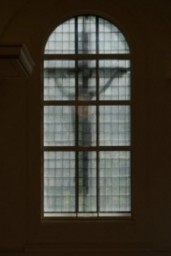
Consecration & Ecclesial Mission

As an institute of pontifical right in the Benedictine monastic tradition, dedicated primarily to contemplation, we have found enormous help for our ongoing renewal in the documents of Vatican II and in those on the consecrated life and the liturgy which have emanated since Vatican II from the Holy See. The serious study and application of these texts to our way of life have deepened our vision and strengthened our conviction concerning the foundations and fabric of our particular form of ecclesial vocation lived with, in and for the Church, under the patronage of Mary, our Mother and Queen. Thus we firmly believe, that in spite of our human frailties, our vocation lived out in faith and love with the blessing of the Church provides us who seek God by this path, with an authentically religious life in the service of God and humanity, which is characterised by: -
a) a total consecration to a life of worship of the Holy Trinity, Father, Son and Holy Spirit, so that we may celebrate unceasingly the ‘magnalia Dei’,
- a consecration rooted in and giving personal, mature expression to our baptismal consecration,
- in and through the daily celebration of the Eucharistic mystery, the seven times daily community choral celebration of the Opus Dei, and in the Perpetual Eucharistic Adoration,
- and by the continual contemplation of the divinely revealed mysteries of our Christian religion within the silence, the ‘lectio divina’, and the loving mutual service of each other in our cenobitic monastic life;
b) this total consecration becomes a stable, lifelong commitment to the Triune God, the Church and humanity by our public profession of and our fidelity to the monastic vows:
- of stability in the Lord’s service in the monastic life within the enclosure of the monastery,
- of conversion of life by which we seek to strive always for that metanoia demanded by Christ’s Gospel for the sake of the Kingdom of Heaven, especially by embracing perfect chastity, evangelical poverty and the spirit of the Beatitudes,
- and of obedience unto death, following in the steps of Christ by renouncing our own will, seeking in all things the will of the Father preferring absolutely nothing to the love of Christ;
c) this lived religious consecration imparts certain qualities to our fundamental Christian evangelising mission which are all-pervasive:
- the intensely liturgical, sacramental and Eucharistic nature of our vocation enables us to live fully the interior, universal and royal priesthood of the faithful by a constant, practical sharing in Christ’s priesthood, especially in the following ways -
by celebrating continually the sacred mysteries of our religion in liturgy and Eucharist all our communities bear constant witness to the supreme divine Triune Transcendence and Immanence;
by the unceasing chorus of divine praise arising from our monasteries in our public worship of the Holy Trinity, ‘we tell among the nations His glory, and His wonders among all the peoples,’ (Ps 95);
by exercising this spiritual mediation between the Blessed Trinity and humanity we share intimately in Christ’s redemptive mission of reconciling humanity with the Father;
by receiving like Christ the guests who are never lacking in the monastery, and drawing them into our monastic prayer and worship we become receivers and dispensers of the boundless mercy of the Heart of our Redeemer, for these guests bring into the circle of our monastic mediation the ‘joy and hope, the grief and anguish of the people of our world’, (cf GS 1);
by our continual liturgical and Eucharistic worship we unceasingly invoke the sanctifying and unifying power of the Holy Spirit upon ourselves, the Church and the world, so that He may make all things holy and draw us all into intimate communion through Christ with the Father – and so our whole life takes on the quality of an unceasing Eucharistic epiclesis uniting us to the universal sanctifying mission of the Holy Spirit.
Thus, by continual exercise of the hidden ministry of this interior universal and royal priesthood we share in some small way in the redemptive and sanctifying missions of the Son and the Holy Spirit, to the glory of the Father. So, with humble confidence we strive to help build up the Church to be more and more ‘a people brought into unity from the unity of the Father, the Son and the Holy Spirit’ (LG 4) – a genuine Sacrament of the Most Holy Trinity.
